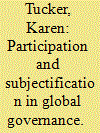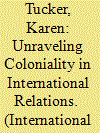| Srl | Item |
| 1 |
ID:
133551


|
|
|
|
|
| Publication |
2014.
|
| Summary/Abstract |
In this article, I examine the ways in which NGO participation in global governance both relies on and produces particular forms of NGO subjectivity. Focusing on NGO interaction with WTO policy-makers in relation to ongoing policy debates about trade, intellectual property law and the protection of 'traditional knowledge' and 'biodiversity', I explore the ways in which particular forms of subjectivity are elicited and rewarded from (would-be) NGO participants in dialogue, consultation and information-sharing with the WTO. I also consider the forms of NGO subjectivity that are treated as normal, credible and acceptable in this field of global governance, and those that are constructed as undesirable and unacceptable. In doing so, I illustrate some of the forms of inclusion and exclusion that underpin the contributions that NGOs make to policy-making on traditional knowledge and biodiversity in the WTO, disrupting and complicating ideas about the qualities that NGOs bring to global governance.
|
|
|
|
|
|
|
|
|
|
|
|
|
|
|
|
| 2 |
ID:
161361


|
|
|
|
|
| Summary/Abstract |
A wide-ranging conversation has been unfolding in the past two decades on the colonial origins and legacies of international relations (IR) and the ways in which these might be overcome. Critiques and counter-projects that draw inspiration from Latin American decolonial thinking have become an increasingly prominent part of this, particularly in the past few years. In this article, I offer an assessment of this nascent decolonial IR. I make two broad arguments: that dominant modes of decolonial critique in IR need to be supplemented by projects that unravel—that is, make sense of and disrupt—racialized power and knowledge relations as they play out across multiple political, economic, and epistemic sites; and that achieving this requires more nuanced and targeted decolonial methodologies than those that are currently available. This leads me to reframe coloniality in IR as a methodological problem, not to supplant questions of epistemology, ontology, or ethics in decolonial IR but to render them more amenable to empirical analysis. Illustrating my discussion through reference to the global governance of “traditional knowledge,” I sketch out a methodological framework for decolonial IR that is attentive to the slow, context-specific processes through which coloniality (re)emerges but is also reshaped.
|
|
|
|
|
|
|
|
|
|
|
|
|
|
|
|